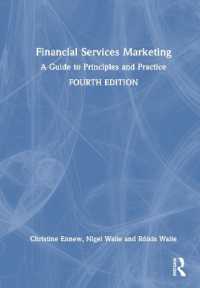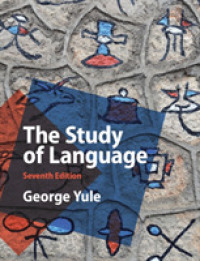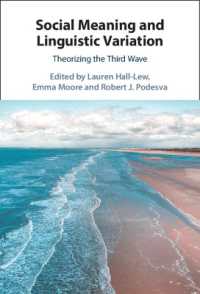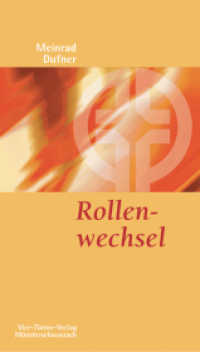Full Description
Who (and what) are you bearing witness to (and for) through your research? When you witness, what claims are you making about who and what matters? What does your research forget, and does it do it on purpose?This book reconceptualizes qualitative research as an in-relations process, one that is centered on, fully concerned with, and lifts up those who have been and continue to be dispossessed, harmed, dehumanized, and erased because of white supremacy, settler colonialism, or other hegemonic world views.It prompts scholars to make connections between themselves as "researchers" and affect, ancestors, community, family and kinship, space and place, and the more than human beings with whom they are always already in community.What are the modes and ways of knowing through which we approach our research? How can the practice of research bring us closer to the peoples, places, more than human beings, histories, presents, and futures in which we are embedded and connected to? If we are the instruments of our research, then how must we be attentive to all of the affects and relations that make us who we are and what will become? These questions animate Weaving an Otherwise, providing a wellspring from which we think about our interconnections to the past, present, and future possibilities of research.After an opening chapter by the editors that explores the consequences and liberating opportunities of rejecting dominant qualitative methodologies that erase the voices of the subordinated and disdained, the contributors of nine chapters explore and enact approaches that uncover hidden connections and reveal unconscious value systems.
Contents
Acknowledgements Foreword. Forward, or rather, toward Leigh Patel Introduction. Weaving an Otherwise Amanda R. Tachine and Z Nicolazzo Part I. BEFORE 1. Refusing Neoliberal Logics in Research Design Samuel D. Museus and Amy C. Wang 2. Survivance-Based Inquiries in and Beyond the Academy Angie Morrill and Leilani Sabzalian 3. "If you can't go to Bella Noche's...". On the Onto-Epistemological Possibilities for Qualitative Researchers Blockett, Leonard D. Taylor, Jr., and Steve D. Mobley Jr. Part II. DURING 4. Archives in the Hold. Overreading Black Student Activism Zachary Brown 5. Heeding Hauntings in Research for Mattering Irene H. Yoon and Grace A. Chen 6. (Re)Considerations of Answerability Through Gifting Christine A. Nelson (K'awaika/Diné. and Heather J. Shotton (Wichita/Kiowa/Cheyenne) Part III. AFTER 7. Blacklove Stories Keon M. McGuire, Kirsten T. Edwards, and T. Elon Dancy, II 8- Learning from Abolition. Reconsidering the Carceral in Educational Research Methodologies Kyle Halle-Erby and Harper Keenan 9- Methodologies for Gesturing Towards Decolonial Futures Sharon Stein, Vanessa Andreotti, Cash Ahenakew, Rene Susa, Elwood Jimmy, Will Valley, Sarah Amsler, Camila Cardoso, Dino Siwek, Tereza Cajkova, Dani D'Emilia, Ninawa Huni Kui, Mateus Tremembe, Rosa Pitaguary, Benício Pitaguary, Nadia Pitaguary, Ubiraci Pataxó, Lynn Mario Trindade Menezes de Souza, Bill Calhoun, Shawn Van Sluys, Carolina Azul Duque, Kyra Royo Fay, Ben Lickerman Afterword — Before, After, During the One Hundred Year Weave K. Wayne Yang About the Authors Index








